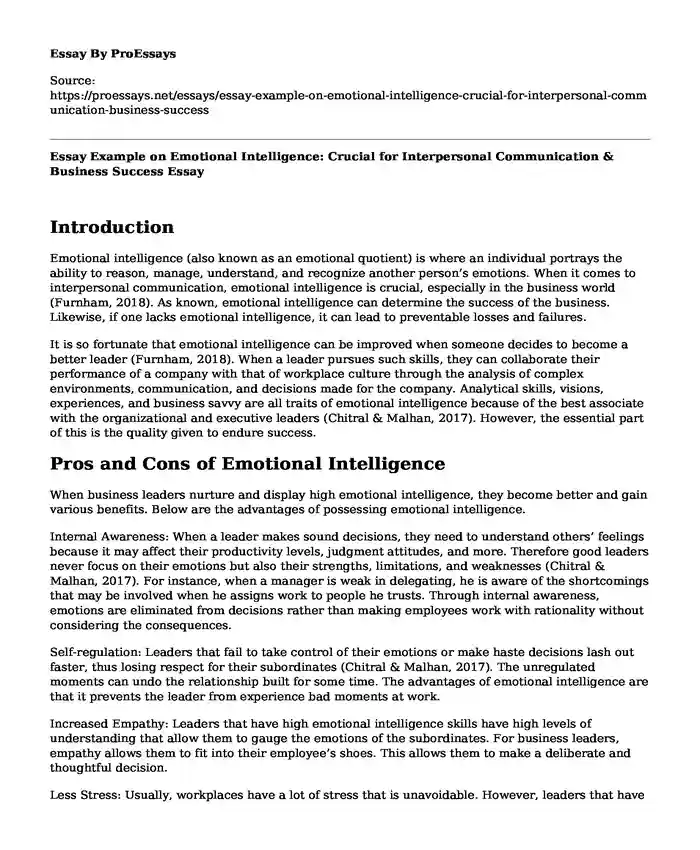Introduction
Emotional intelligence (also known as an emotional quotient) is where an individual portrays the ability to reason, manage, understand, and recognize another person’s emotions. When it comes to interpersonal communication, emotional intelligence is crucial, especially in the business world (Furnham, 2018). As known, emotional intelligence can determine the success of the business. Likewise, if one lacks emotional intelligence, it can lead to preventable losses and failures.
It is so fortunate that emotional intelligence can be improved when someone decides to become a better leader (Furnham, 2018). When a leader pursues such skills, they can collaborate their performance of a company with that of workplace culture through the analysis of complex environments, communication, and decisions made for the company. Analytical skills, visions, experiences, and business savvy are all traits of emotional intelligence because of the best associate with the organizational and executive leaders (Chitral & Malhan, 2017). However, the essential part of this is the quality given to endure success.
Pros and Cons of Emotional Intelligence
When business leaders nurture and display high emotional intelligence, they become better and gain various benefits. Below are the advantages of possessing emotional intelligence.
Internal Awareness: When a leader makes sound decisions, they need to understand others’ feelings because it may affect their productivity levels, judgment attitudes, and more. Therefore good leaders never focus on their emotions but also their strengths, limitations, and weaknesses (Chitral & Malhan, 2017). For instance, when a manager is weak in delegating, he is aware of the shortcomings that may be involved when he assigns work to people he trusts. Through internal awareness, emotions are eliminated from decisions rather than making employees work with rationality without considering the consequences.
Self-regulation: Leaders that fail to take control of their emotions or make haste decisions lash out faster, thus losing respect for their subordinates (Chitral & Malhan, 2017). The unregulated moments can undo the relationship built for some time. The advantages of emotional intelligence are that it prevents the leader from experience bad moments at work.
Increased Empathy: Leaders that have high emotional intelligence skills have high levels of understanding that allow them to gauge the emotions of the subordinates. For business leaders, empathy allows them to fit into their employee’s shoes. This allows them to make a deliberate and thoughtful decision.
Less Stress: Usually, workplaces have a lot of stress that is unavoidable. However, leaders that have emotional intelligence have the skills of managing stress on both their co-workers and families (Chitral & Malhan, 2017). Such leaders also manage to balance their personal and work life by separating work emotions and home emotions. When leaders embrace emotional intelligence, they can influence their relationship with the team members about how they interact with each other.
The lack of emotional intelligence can also come with consequences. Various ways are experienced, but below are the noticeable changes.
Stressful Situations: Leaders that lack such skills end up having adverse reactions in stressful situations because they cannot curb the matter. Most of the time, they adapt behaviors such as being passive-aggressive, blaming people, and yelling at workers (Furnham, 2018). As a result, he creates a stressful environment, and this makes workers have eggshells to prevent an outburst from their boss.
Inhabitancy of Collaboration: In most cases, leaders that lack emotional intelligence are unable to deal with their emotions, and this makes them react negatively to the employees (Furnham, 2018). Instead of contributing to ideas that will make the subordinates work better, they fear because of the results.
References
Chitral, A., & Malhan, M. (2017). Importance of emotional intelligence at the workplace. 2007 IEEE International Engineering Management Conference, 98-124. https://doi.org/10.1109/iemc.2007.5235031
Furnham, A. (2018). The importance and training of emotional intelligence at work. Assessing Emotional Intelligence, 137-155. https://doi.org/10.1007/978-0-387-88370-0_8
Cite this page
Essay Example on Emotional Intelligence: Crucial for Interpersonal Communication & Business Success. (2023, Sep 10). Retrieved from https://proessays.net/essays/essay-example-on-emotional-intelligence-crucial-for-interpersonal-communication-business-success
If you are the original author of this essay and no longer wish to have it published on the ProEssays website, please click below to request its removal:
- Case Study: Human Behavior
- Evidence-Based Medicine in Depression Essay Example
- Essay Example on Creativity: Thinking Beyond the Obvious
- Essay on Jennifer Lawson's Unfortunate Journey Through Companies: A Tale of Injustice
- Essay Sample on Promoting Health & Reducing Risk: Basics of Community/Public Health
- Family Influence on Socialization Essay Example
- The Power of Eating: Mental Health and Diet - Essay Sample







